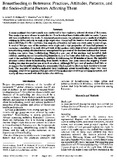Breastfeeding in Botswana: Practices, Attitudes, Patterns, and the Socio-cultural Factors Affecting Them
Date
2002-08Author
Mahgoub, S.E.O.
Bandeke, T.
Nnyepi, M.
Publisher
Oxford University Press; http://tropej.oxfordjournals.org/Type
ArticleMetadata
Show full item recordAbstract
A cross-sectional descriptive study was conducted in four randomly selected districts of Botswana. Two study sites were chosen in each district. Four hundred households with children under 3 years old were enrolled into the study. A structured questionnaire was administered to mothers of eligible children in 50 households in each of the eight sites. About half the families had monthly incomes below 400 Pula (1 US$ = 4.6 Pula). The majority of families had only one child under 3 years of age. A total of 76.4 per cent of the mothers were single and a high proportion of them had primary or secondary education. Over half, 59.3 per cent, of the mothers had a high level of information about breastfeeding mainly obtained before conception; 94.4 per cent of the mothers believed that breastfeeding was better than bottlefeeding. Ninety-five per cent of the mothers had breastfed their children, and they started breastfeeding immediately or a few hours after delivery. More than 85 per cent of the mothers were planning to continue breastfeeding for 18 months or more. The majority obtained advice about breastfeeding from health workers. The main reason for stopping breastfeeding was that the mother was at work or school. Although 58.2 per cent of mothers had little or no support for breastfeeding from the community it had a positive effect on their decision to breastfeed. The majority of mothers indicated their confidence about breastfeeding when they were pregnant. Over three-quarters (79.6 per cent) of the mothers delivered in government hospitals, and nearly all were roomed with their babies after delivery.

